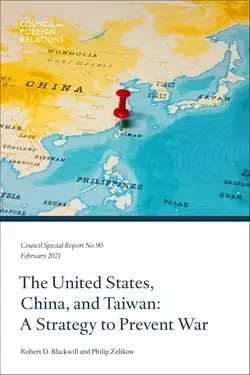
The United States, China, and Taiwan: A Strategy to Prevent War

To preserve peace in the Taiwan Strait, Robert D. Blackwill and Philip Zelikow propose the United States make clear that it will not change Taiwan’s status, yet will work with allies to plan for Chinese aggression and help Taiwan defend itself.
- Council Special Report
- Concise policy briefs that provide timely responses to developing crises or contributions to current policy dilemmas.
Taiwan “is becoming the most dangerous flash point in the world for a possible war that involves the United States, China, and probably other major powers,” warn Robert D. Blackwill, Council on Foreign Relations (CFR) Henry A. Kissinger senior fellow for U.S. foreign policy, and Philip Zelikow, University of Virginia White Burkett Miller professor of history.
In a new Council Special Report, The United States, China, and Taiwan: A Strategy to Prevent War, the authors argue that the United States should change and clarify its strategy to prevent war over Taiwan. “The U.S. strategic objective regarding Taiwan should be to preserve its political and economic autonomy, its dynamism as a free society, and U.S.-allied deterrence—without triggering a Chinese attack on Taiwan.”
More on:
“We do not think it is politically or militarily realistic to count on a U.S. military defeat of various kinds of Chinese assaults on Taiwan, uncoordinated with allies. Nor is it realistic to presume that, after such a frustrating clash, the United States would or should simply escalate to some sort of wide-scale war against China with comprehensive blockades or strikes against targets on the Chinese mainland.”
“If U.S. campaign plans postulate such unrealistic scenarios,” the authors add, “they will likely be rejected by an American president and by the U.S. Congress.” But, they observe, “the resulting U.S. paralysis would not be the result of presidential weakness or timidity. It might arise because the most powerful country in the world did not have credible options prepared for the most dangerous military crisis looming in front of it.”
Proposing “a realistic strategic objective for Taiwan, and the associated policy prescriptions, to sustain the political balance that has kept the peace for the last fifty years,” the authors urge the Joe Biden administration to
- affirm that it is not trying to change Taiwan’s status;
- work with its allies, especially Japan, to prepare new plans that could challenge Chinese military moves against Taiwan and help Taiwan defend itself, yet put the burden of widening a war on China; and
- visibly plan, beforehand, for the disruption and mobilization that could follow a wider war, but without assuming that such a war would or should escalate to the Chinese, Japanese, or American homelands.
“The horrendous global consequences of a war between the United States and China, most likely over Taiwan, should preoccupy the Biden team, beginning with the president,” the authors conclude.
More on:
Professors: To request an exam copy, contact [email protected]. Please include your university and course name.
Bookstores: To order bulk copies, please contact Ingram. Visit https://ipage.ingramcontent.com, call 800.937.8200, or email [email protected]. Include ISBN: 978-1-64052-400-2.
 Online Store
Online Store
